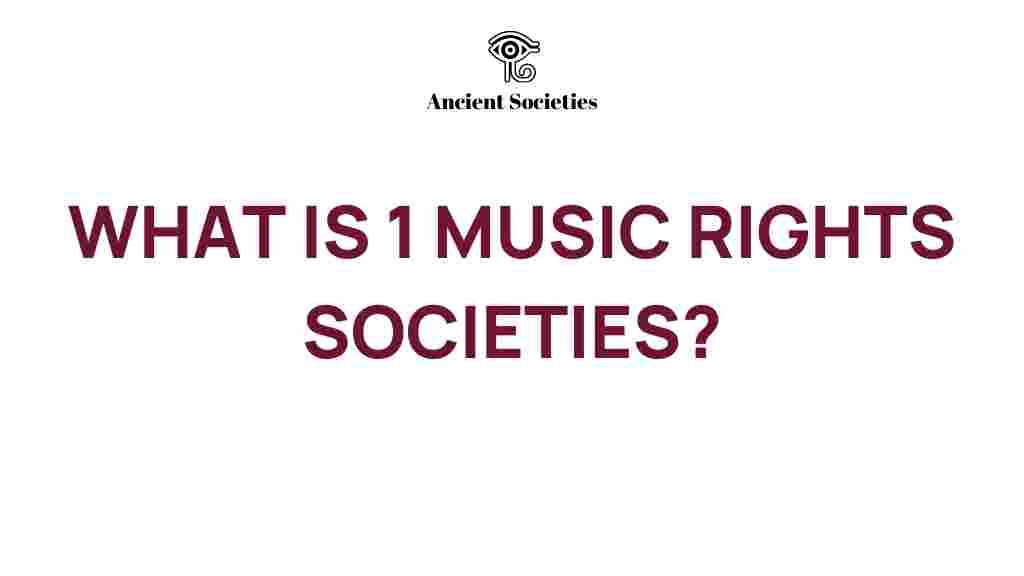Unveiling Music Rights Societies: Guardians of Your Favorite Tunes
The world of music is a vibrant tapestry woven from creativity, emotion, and expression. However, behind the scenes, there exists a complex network that ensures creators are compensated for their hard work: music rights societies. In this article, we will explore the essential roles these organizations play in protecting artists’ rights, managing copyright, and distributing royalties. Understanding these aspects can enhance your appreciation for the music industry and its various stakeholders.
What Are Music Rights Societies?
Music rights societies, often referred to as collecting societies, are organizations that manage the rights of creators, ensuring they receive fair compensation for the use of their music. These societies focus on several key areas:
- Copyright Management: They protect the copyright of musicians and songwriters, ensuring their intellectual property is not used without permission.
- Royalty Collection: They collect royalties from businesses and individuals who use music, such as radio stations, television broadcasters, and venues.
- Licensing: They issue licenses to ensure that music users comply with copyright laws.
- Performance Rights: They monitor and enforce the performance rights of musicians in public spaces.
How Music Rights Societies Work
Understanding how these societies operate is crucial for both artists and music consumers. Here’s a step-by-step breakdown:
Step 1: Registration
Musicians and songwriters must register with a music rights society to protect their work. This process usually involves:
- Filling out an application form.
- Providing necessary documentation that proves ownership of the music.
- Agreeing to the society’s terms and conditions.
Step 2: Licensing Agreements
Once registered, the society negotiates licensing agreements with businesses that use music. This can include:
- Restaurants and bars playing background music.
- Television shows and films using songs.
- Radio stations broadcasting music.
Step 3: Royalty Collection
After licensing, the society collects royalties on behalf of the artists. This process involves:
- Tracking music usage across various platforms.
- Collecting payments from licensees based on the agreements.
Step 4: Distribution of Royalties
Once royalties are collected, they are distributed to the artists based on their share of the performance or usage. This can often be a complex process that involves:
- Calculating the number of times a song has been played.
- Dividing royalties among songwriters, performers, and producers.
Types of Music Rights
There are several types of music rights that music rights societies manage. Understanding these can help artists and consumers better navigate the music industry:
- Copyright: The legal right of the creator to control how their music is used.
- Performance Rights: Rights related to the public performance of music.
- Mechanical Rights: Rights related to the reproduction of music on physical media like CDs.
- Synchronization Rights: Rights needed for using music in film, television, and video games.
Importance of Music Rights Societies
For artists, music rights societies are crucial for several reasons:
- Protection: They protect musicians from unauthorized use of their music.
- Financial Support: They provide a source of income through royalties, allowing artists to sustain their careers.
- Industry Representation: They advocate for musicians’ rights within the broader music industry.
Challenges Faced by Artists
While music rights societies play a vital role in protecting musicians, there are challenges that artists face in the industry:
- Complexity of Agreements: Understanding licensing agreements can be daunting for many musicians.
- Royalty Distribution Issues: Some artists report difficulties in receiving timely and accurate royalty payments.
- Global Variations: Different countries have different laws regarding copyright and royalties, complicating international use of music.
Troubleshooting Common Issues
Artists may encounter various issues when dealing with music rights societies. Here are some common problems and potential solutions:
Issue 1: Delayed Royalty Payments
Solution: Regularly check your account with the society to ensure all your music usage is being tracked. If you notice discrepancies, contact the society for clarification.
Issue 2: Confusing Licensing Agreements
Solution: Consider consulting with a music attorney who can help you understand the terms and conditions of any agreements you enter into.
Solution: Report any unauthorized use of your music to the music rights society, which can take legal action on your behalf.
Conclusion
Music rights societies are essential guardians of the creative works that enrich our lives. By managing copyright, collecting royalties, and protecting the performance rights of artists, they ensure that musicians receive the compensation they deserve. As consumers, understanding the importance of these organizations can enhance our appreciation of the music we love. Whether you are a musician seeking to safeguard your work or a listener wanting to support your favorite artists, knowing about music rights is invaluable.
For more information about music rights societies and their role in the industry, you can visit this resource.
To learn more about licensing music for your projects, check out this guide.
This article is in the category Culture and created by AncientSocieties Team
